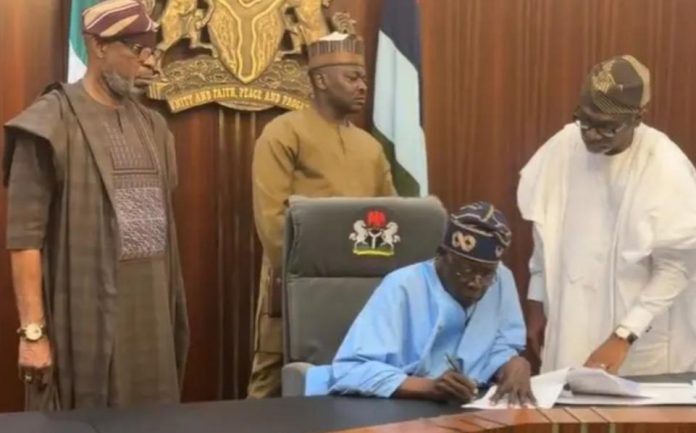British High Commissioner to Nigeria, Richard Montgomery has revealed his country’s readiness to work with Nigeria.
He said the UK is awaiting the appointment of ministers by President Bola Tinubu before taking necessary steps toward strengthening collaboration.
Montgomery, who stated this in an interview with the News Agency of Nigeria, NAN, in Abuja weekend, said the UK government had identified six areas in which both countries could strengthen cooperation and explore “new areas to build upon for mutual benefits”.
He said the UK was more interested in bilateral ties with Nigeria as informed by Tinubu’s recent economic decisions.
“We have very long-standing ties being wired by history and we do have a very strong foundation on which to build and I am very optimistic about Nigeria’s direction in the coming years.
“We wish to build on our economic relations in particular and the first decisions by the new administration show that it is going to take big decisions on the economy which I think will give us the opportunity to grow our trade, investment, and economic relations.
“I think there are a number of areas where the UK government can step up our diplomacy, our bilateral relations with Nigeria.
‘’But of course, we await the appointment of new ministers so that we can have the diplomatic dialogue necessary to lay the grounds for some of those.
“I will say that there are six areas we would like to explore. The first is, long-standing development cooperation.
“I think what the UK always needs to do when a new administration comes into place is, we need to understand the priorities of that administration and how we can adapt and work in mutual partnership and with our development programmes.
“The second is the economic area. We already have a good economic dialogue but we would like to take the next step and develop a form of a more enhanced trade and partnership – something I am quite keen to discuss with the new minister of trade and industry.
“The third area is security and defence, which we would like to evolve and take forward. We already have a good relationship on home affairs, with your interior ministry and other agencies, and that is an area where we would like to continue our collaborations.
“Finally, we would like to have a more systematic dialogue on foreign policy. Nigeria has played a very valuable role in regional and continental issues and the UK would like to have a more systematic foreign policy dialogue with the government of Nigeria once the ministers and advisers are in place,’’ he said.
Montgomery also said the UK government’s new policy on the restriction of foreign student visas was aimed at managing the pressure on social services for scholars.
He explained that the policy was not targeted at discouraging Nigerian students studying in the UK, and urged Nigerians to see the new visa regime in the UK in a bigger context which, according to him, is “really a positive for Nigeria and the United Kingdom.”
The high commissioner, who noted that at the moment, Nigerians desiring to study in the UK had a 97 per cent visa approval rate, said: “Three years ago, there were 20,000 Nigerian students in British higher education institutions, and last year, the number increased to 127,000.
“So, we had a five-fold increase in the number of students from Nigeria coming to UK universities.
“We are delighted that UK universities continue to attract the best and brightest from Nigeria.”
The envoy stated that in 2022, “the UK granted three million new UK visas of various types, including students and other visitors.”
He said: “Nigerians alone received 325,000 of those three million visas. So more than 10 per cent of the visas from the UK are to Nigerian citizens, which is fantastic.
“It goes back to the fact that the UK and Nigeria have strong people-to-people links. The policy change is about people who are doing non-research degrees coming to the UK as undergraduates, or for a one-year master’s degree programme, and who decide to bring their dependents.
“We have had a very significant rise in the number of people coming from all around the world, not just from Nigeria.
“Sometimes it is difficult to find good accommodation as a student and there is real pressure on housing and social services for students.
“If you looked at it three years ago, only 1,500 dependents of students were coming to the UK from Nigeria, but now it was 52,000 last year.
“I am just trying to put it in proper context, that this is an adjustment. The words that are being used in the media to describe the situation are misrepresenting.
‘’We are making an adjustment that enables us to manage the demands on services in university towns and elsewhere.
“Nigerians are very successful in acquiring visas. We have a 97 per cent approval rate and so that is the big context.’’
He expressed the UK’s pride in its research institutes and higher education, listed among the top hundred universities in the world.
According to him, the higher institutions are very open to students going to study in the UK.
He expressed the belief that Nigerians stand to gain massively from the international exposure and international networks offered by studying in the UK.
Recall that the UK Home Office had in May announced that from January 2024, undergraduate and master’s students would no longer be allowed to take their dependents along with them to the UK.
The restriction does not, however, apply to students in research programmes.

